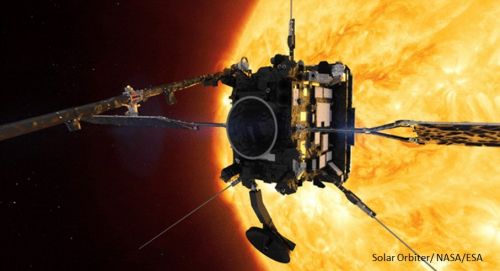
10/02/2020
With Solar Orbiter, SENER approaches a star
With Solar Orbiter, SENER approaches a star
This morning, the European Space Agency (ESA) Solar Orbiter mission, in partnership with NASA, took off from Cap Canaveral (USA). The satellite is now travelling towards the sun in order to take pictures of its north and south poles for the first time.
In order to forecast solar wind bursts that sometimes violently collide the earth and can disrupt our communication systems (and even jeopardise the lives of astronauts), an accurate model of the local magnetic field of our star is required: the images of the poles taken by Solar Orbiter from its privileged location out of the ecliptic plane will improve the existing models.
But the design of such a satellite is challenging: for instance, working temperatures of the Solar Orbiter external equipment will reach 400ºC at the closest distance from the sun and -100ºC at the largest one…
SENER is involved in this scientific and technological adventure: the multinational engineering and technology group (2,300 people in 18 countries with Catalan headquarters set up in the Barcelona Synchrotron Park with a strong activity in the aerospace sector) designed different elements of the satellite. By the way, this mission is the largest space contract ever awarded to SENER, which worked in parallel on five different contracts, such as the antennae subsystem or a retractable boom carrying four of the ten instruments.
More information about the SENER’s contribution: here
In order to forecast solar wind bursts that sometimes violently collide the earth and can disrupt our communication systems (and even jeopardise the lives of astronauts), an accurate model of the local magnetic field of our star is required: the images of the poles taken by Solar Orbiter from its privileged location out of the ecliptic plane will improve the existing models.
But the design of such a satellite is challenging: for instance, working temperatures of the Solar Orbiter external equipment will reach 400ºC at the closest distance from the sun and -100ºC at the largest one…
SENER is involved in this scientific and technological adventure: the multinational engineering and technology group (2,300 people in 18 countries with Catalan headquarters set up in the Barcelona Synchrotron Park with a strong activity in the aerospace sector) designed different elements of the satellite. By the way, this mission is the largest space contract ever awarded to SENER, which worked in parallel on five different contracts, such as the antennae subsystem or a retractable boom carrying four of the ten instruments.
More information about the SENER’s contribution: here
More news
20/09/2018
UAB’s researchers awarded by ERC
14/09/2018
More than 8,600 foreign companies in Catalonia
06/09/2018
SMEs: a European call for access to synchrotrons
27/07/2018
ICMAB and ICN2 work on the batteries of the future
20/07/2018
Molecular mimicry does not mislead ALBA!
13/07/2018
How about olive pits to filter the air?!









